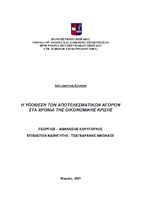Η Υπόθεση των Αποτελεσματικών Αγορών στα χρόνια της οικονομικής κρίσης

Master Thesis
Συγγραφέας
Κουλτούκης, Γεώργιος - Αθανάσιος
Ημερομηνία
2021Επιβλέπων
Τσαγκαράκης, ΝικόλαοςΠροβολή/
Λέξεις κλειδιά
Αποτελεσματικότητα των αγορών ; Υπόθεση της Αποτελεσματικής Αγοράς ; Χρηματιστηριακοί δείκτες ; Εμπλεκόμενοι στην αγοράΠερίληψη
Στην σύγχρονη χρηματοοικονομική, η αποτελεσματικότητα των αγορών (efficient markets) αποτελεί ένα σημαντικό ζητούμενο, αφού συνδέεται με την συμπεριφορά των επενδυτών και την προσπάθεια τους να προβλέψουν με αξιοπιστία τις διακυμάνσεις των αγορών. Σε μια αποτελεσματική αγορά οι εμπλεκόμενοι σε αυτή (market stakeholders) μπορούν να θεωρούν αξιόπιστες τις τρέχουσες τιμές για κάθε επενδυτική απόφαση που αφορά αγορά ή πώληση κάποιου τίτλου, με την αξιοποίηση εργαλείων της αγοράς παραγώγων. Αντίθετα, σε κάθε άλλη περίπτωση, η εμφάνιση των κερδοσκόπων δημιουργεί αγεφύρωτα ρήγματα στην εμπιστοσύνη των αντισυμβαλλομένων προς τις τρέχουσες τιμές, με συνέπεια τη μη αποτελεσματική αξιοποίηση των τιμών για επενδυτικούς σκοπούς. Ο σκοπός της παρούσας εργασίας είναι (α) η εξέταση του εννοιολογικού περιεχομένου και (β) τον έλεγχο της ισχύς της Υπόθεσης της Αποτελεσματικής Αγοράς (ΥΑΑ) σε περιβάλλον οικονομικής κρίσης, συγκρίνοντας την Ελληνική χρηματοπιστωτική αγορά με άλλων κρατών. Η ανάλυση έδειξε ότι υπάρχει αποτελεσματικότητα στους δείκτες και κατ΄ επέκταση στα χρηματιστήρια. Οι δείκτες AEX, ATHEX, DAX30 & FTSE MIB, εμφανίζονται στατιστικά σημαντικοί (Sig.:,000) επομένως, απορρίπτεται η μηδενική υπόθεση (9), αυτό συνεπάγεται την υπόθεση της αποτελεσματικής αγοράς αλλά και τον τυχαίο περίπατο, επεξηγηματικά οι τιμές είναι τυχαίες και απρόβλεπτες. Συγκεκριμένα, παρατηρείται ισχυρή αρνητική συσχέτιση (>-,6) μεταξύ της εξαρτημένης μεταβλητής (Rt) και των παραμέτρων [β2, β3, β4, β5], με σημαντική στατιστική σημαντικότητα (Sig.2-tailed: 0,000), ενώ μόνο στον ΑΤΗΕΧ & ΑΕΧ διαπιστώθηκε για την παράμετρο β3, μέτρια αρνητική συσχέτιση, αλλά με σημαντική στατιστική σημαντικότητα (Sig.2-tailed: 0,000). Επιπλέον, για τον δείκτη ΑΤΗΕΧ (Ελλάδα), η κατάταξη των τιμών της Rt από την μέγιστη προς την ελάχιστη τιμή, έδειξε ότι η χαμηλότερη ήταν πριν το Μνημόνιο (κατά την περίοδο της διεθνούς ύφεσης 2007-8), με άνοδο της Rt σταδιακά στις επόμενες περιόδους, με μεγαλύτερη την περίοδο μετά τα Μνημόνια (2018-2020).


